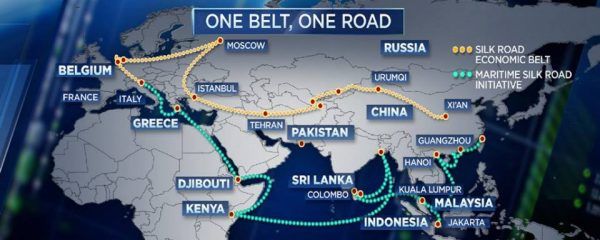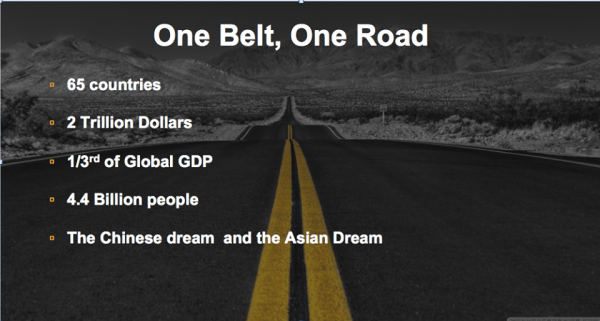China’s new road will most likely fund Iranian-sponsored terror groups. China’s modern Silk Road is being channeled toward Kashmir and, if successful, will most likely shift financial power in the Middle East toward Iranian objectives. China’s “One Belt, One Road” (OBOR) initiative will be operated by host nations and will most likely be exploited for individual goals.
It is highly probable that the land-bridge portion of the OBOR will go through Pakistan, Iran, and Turkey to get to Europe. Kashmir is the key piece of terrain that is keeping the China-Pakistan Economic Corridor (CPEC) from strengthening Iran’s regional objectives.
OBOR is an Attempt to Dominate Economy and Resources
On September 7, 2013, Chinese President Xi Jingping unveiled China’s OBOR initiative with the following goals: strengthen policy communications, improve road connectivity, promote trade, enhance the circulation of money, and strengthen people-to-people exchanges throughout Eurasia. Although Beijing’s OBOR sounds positive, it is likely that the People’s Republic of China’s goal incorporates the increase of regional hegemony through economic dominance and control over the various resources and trade throughout Eurasia.
The OBOR’s two-pronged plan consists of a Eurasian land-bridge and a maritime route. The land bridge will be constructed of over 140,000 kilometers of roads and railways, and the maritime portion is comprised of ports and ships throughout the Indian Ocean. China has allocated $1.4 trillion for the project and has begun investing in construction projects all over the world. Additionally, China has started to locate, collect, and control the resources in Africa and Latin America.

However, any attempt of regional hegemony will mostly likely fall to sub-contracted control. Much like the Silk Road from the Han Dynasty and Mongol Empire, China cannot occupy, maintain, and otherwise operate the many functions of a trade route this large. Because China will not be able to man every portion of the road, host nations will sustain local functions (i.e., checkpoints, vehicles, and nexuses along the OBOR). Local control will have a significant impact on the factors of production and expenditures as it relates to localized needs and allied goals.
Influencing the Direction of the OBOR
There are six economic corridors that China has identified. It is highly probable that the Chinese-Pakistan Economic Corridor will become the initial direction for the land bridge. The OBOR will most likely go through countries whose economy will benefit from interconnectivity and do not have a large enough economic system to compete against China’s. Although China is surrounded by many countries, there are three major entities that will push the route toward Pakistan and Iran: Russia, India, and the Indian Ocean.
It is highly probable that Russia and India will not support China’s initiative and will remain in competition. India has not reached an agreement with Beijing over the OBOR passing across it from east to west, and only supports the construction moving from north to south across Doklam and Bhutan toward Bangladesh.
Although the OBOR’s maritime trade route has a port in Bangladesh, two in Iran, and another in Djibouti, China will most likely want to increase trade over land. The Bab-el-Mandeb strait is a least-likely avenue do to piracy around Yemen and Djibouti. However, China conducts trade through the Iranian ports in Chabahar and Bandar Abbas from the Payra sea port in Bangladesh. The distance from Payra to Chabahar (Iran’s eastern sea port) is approximately 3,500 miles without a trading post or port between. Therefore, a land-bridge will be more efficient, secure, and serve an increased purpose as it passes through other nations that are willing to trade.

Voting Power and the AIIB
Russia and India are more likely to influence, gain profit by, and otherwise participate with the OBOR through a voting process in the Asia Infrastructure Investment Bank (AIIB). The AIIB is a $1.4 trillion Chinese-backed investment group that incorporates at least 38 Eurasian economies. Each member’s investment into the bank purchases a percentage of the bank’s voting power. Thus indicating, those with larger global domestic product (GDP) are more likely to afford a larger vote and influence the OBOR through a democratic process within the AIIB.
Conversely, those with less GDP are more likely to adopt a portion of the road to elevate their economy with capitol and labor. Russia has the seventh-largest GDP purchasing power and India has the fourth. Both nations have become two of the top five voting members of the AIIB (6.2499 percent and 7.9524 percent, respectively). On the other hand, Pakistan is the twenty-sixth largest economy and could only afford to control 1.2154 percent of AIIB’s vote.
Pakistan’s OBOR Eagerness
Pakistan has a high poverty rate and a weak economy that will benefit from the OBOR. With dubious distinction, 29.5 percent of Pakistan’s population is below the poverty line, and the nation does not have as strong of a GDP purchasing power as India or Russia. Pakistan has many products and industries that will most likely increase from trade associated with the OBOR.
US Sanctions Push Iran to China
Beyond Pakistan, Iran, the predominate Shia state that opposes the Sunni majority Middle East and northern Africa, has a high probability of increasing trade with China. The US has placed sanctions on Iran that restrict trade and other economic growth. Therefore, Iran has turned to China for trade. China trades with Iran with the Bank of Kunlun Co., Ltd. and the AIIB. When US sanctions were most stringent, Iranian trade was around $550 million. However, with China, according to the July 2017 estimate, trade is around $18 billion. Although Iran and China are trading through a portion of the maritime route (from Bangladesh to Iran), to increase trade the next step seems to be the connection of the OBOR to Iran through Pakistan.
Dispute Over Kashmir is Keeping China from Iran
Tension among China, Pakistan, and India over Kashmir will most likely increase as China and Pakistan continue construction through the region without India’s approval. Kashmir lays between India, Pakistan, and China at an elevation of approximately 1,850 meters above sea level. The eastern region is the Chinese-controlled portion, Aksai Chin; Pakistan controls Jumma to the west and north; and the central and southern portions are controlled by India.
Conflict Origin
The dispute over Kashmir started during the decolonization period of the early twentieth century and remains one of the largest disputed borders in the world today. At the 1914 Simla conference, Sir Henry McMahon, the foreign secretary of British India, along with the representatives of Tibet and China, drew a 550-mile line on a map that would become border in the area after British colonization ended. The imposed McMahon line was the source of the 1947 India-Pakistan war, 1962 Sino-India war, 1965 India-Pakistan war, and the 1999 Kargil war.
With deep roots in conflict, tensions have escalated as China seeks to build the OBOR through the Aksai Chin portion around the Indian-controlled section southwest to Pakistan. Although Pakistan ceded its portion of Kashmir to China in 1964, India does not recognize China’s regional dominance and refuses to allow the OBOR to connect directly to Pakistan.

Status of Kashmir
Beijing has not reached an agreement with India over Kashmir, and the threat of conflict has intensified as China continues construction. In July 2017, China and Pakistan sent 3,000 light-infantry troops to Kashmir. By August, tensions became physical when Chinese and Indian troops began throwing rocks at each other near Pangong Lake. The Chinese troops claimed to have been lost in inclement weather, but Indian forces disagreed. It is more likely that China is testing its bounds and diverting attention from the western portion of Kashmir, where construction ensues.
Pressure on the western portion of Kashmir is reaching a boiling point as Pakistani Staff General Zubair Mahmood has accused India of indirect sabotage by using the Taliban as a proxy to engage and otherwise derail the OBOR. India might have switched to covert activity over direct conflict between India and Pakistan, which resulted in the death of more than 18 Indian soldiers in October 2016. However, accusing India of creating a proxy war may be nothing more than a false circumstance that can lead to Chinese intervention, like the Chinese government did to invade Bhutan for “aid” in August.
United States’ trade with Pakistan and China will most likely be affected if the OBOR connects to Iran through Kashmir and Pakistan. Some news sources claim that President Donald Trump openly supports India against China’s initiative and other agencies claim that President Trump supports China’s OBOR. Whichever claim is true, India sought to gain a tactical advantage over China and Pakistan by increasing its unmanned aerial vehicle (UAV) arsenal with 22 Guardian and 40 Predator drones, which the US supported in July 2017.
The US has trade with India, Pakistan, Afghanistan, and China and will most likely aim to maintain its current trade along with the sanctions on Iran. In any event, China is unlikely to relinquish Aksai Chin and Jammu to India.
Threat Assessment
If the CPEC becomes the main thoroughfare for the OBOR, then Iranian power will increase and rival the other powers in the Middle East. In 2014 it was revealed that China was sponsoring Hezbollah, Hamas, and other Shi’ite militias in Iraq through the Bank of Kunlun Co., Ltd. and the Central Bank of Iran (CBI). In the same year, the US placed sanctions on Iran and claimed that Iran was sponsoring terrorism.
Although it was uncovered in 2015 that Chinese funds supported Iranian-backed terrorist organizations, China has not slowed its investments in Iran. Iran is a founding member of the AIIB, continues to trade with China, and is allowing China to construct and improve roads and railways that are oriented east to west. It is highly probable that any new funds will be used by Iran to sponsor further terrorist organizations and construction in the future.
From China Through Kashmir and to Iran
As China aims to increase Eurasian ties, it is highly probable that nations with a lower GDP and those with imposed sanctions will welcome the OBOR. Most likely, they will use the profit to shift power and strengthen private goals. Russia and India are reluctant to grant China economic control through their regions. However, China has not slowed down. Instead, China has increased troops in Kashmir and construction in Pakistan and Iran. Therefore, it is most likely that China will try to pass the OBOR from Kashi, China, through Kashmir into Pakistan, and further west to Iran. China’s OBOR does possess the ability to strengthen economies by investing with the AIIB, but if China connects to Iran through Pakistan, an increased conflict in the Middle East may result.
















